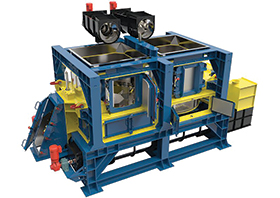

The challenge
The world’s attention is on environmental sustainability, and the pressure on countries and companies to demonstrate their commitment to preserving the environment and preventing climate change is at an all-time high. As we confront a multitude of environmental and social challenges, managing waste and maximising landfill diversion can play a key role.
Any waste that is not recycled or reused ends up at a landfill site or as pollution on land or in the ocean. Landfills are a major source of pollution, releasing leachate, methane, CO2 emissions and various other toxins directly into the environment. The world generates about 2 billion tons of household waste as municipal solid waste (MSW) annually. As the human population continues to grow, this is forecast to rise to 3,4 billion tons by 2050.
The solution
With waste being among the most impactful of global problems, opportunities for waste consolidation continue to gain attention. Several plants are currently in operation that use LOESCHE’s A/FUEL technology, and we continue to demonstrate the potential for converting municipal solid waste, waste wood and other carbon-based waste into recyclable material streams and alternative fuels. This approach contributes to the management of the ever-increasing volumes of MSW as it utilises the waste generated in an environmentally sound manner. It also offers the opportunity to reduce the consumption of conventional fuel, resulting in a reduction in CO2 emissions.
Playing a vital part in the process is the A TEC Rocket Mill technology which is provided by the Austrian member of the LOESCHE family. Pretreated waste is fed into the Rocket Mill, where it is comminuted to the required particle size. Due to the higher surface area of the final particle compared to traditional cutting mills and shredders, the process optimises fuel combustibility.
A variety of waste-derived fuels, such as refuse derived fuel (RDF), solid recovered fuel (SRF) fluff, or SRF pellets can be produced. The fuel type produced will depend on the process of the target end user, and includes thermal power plants, gasifiers, circulating fluidised bed (CFB) boilers, main cement burners and calciners. Landfill overuse is an issue worldwide. However, the challenge each country faces varies based on its energy requirements and the composition of its MSW. LOESCHE is in the process of developing modular plants that will provide global waste-to-fuel solutions.
Environmental impact
While changing consumer habits to reduce overall consumption starts on the individual level, LOESCHE is actively working to advance the reuse and recycling of material streams otherwise destined for landfills. Together with partners from industry, governments and a growing number of financial investors, LOESCHE is committed to reducing its carbon footprint through its expertise in generating alternative fuels from the waste industry.
The company is committed to being a lifecycle partner and not just an OEM.
To combat climate change, it is imperative that all industries take extraordinary measures to cut their CO2 emissions significantly. LOESCHE is at the forefront of developing technologies that enhance the production process, conserve energy and minimise emissions.
In the years ahead, we will remain committed to intensive research and development efforts to develop cutting-edge solutions that are suitable for widespread industrial adoption. Our goal is to provide an extensive array of sustainable solutions that align with our vision of a greener future.
| Tel: | +27 11 482 2940 |
| Email: | [email protected] |
| www: | www.loesche.com |
| Articles: | More information and articles about Loesche South Africa |
© Technews Publishing (Pty) Ltd | All Rights Reserved